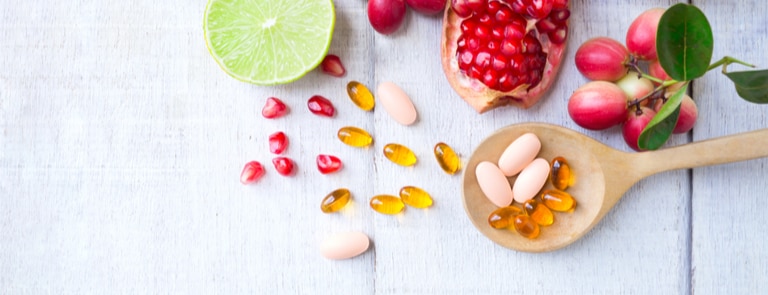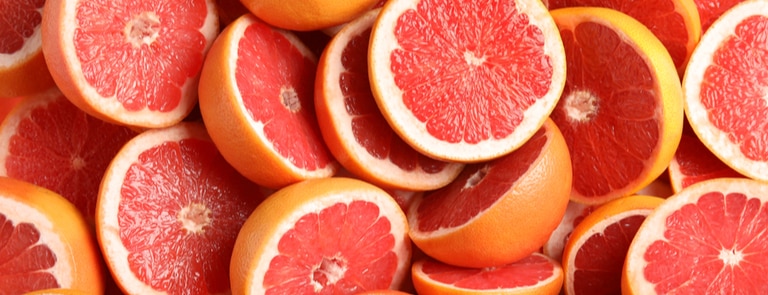10% off £30 OR 15% off £40
Code:DECIDE
30+ Vitamin K foods

Do you want to increase your Vitamin K intake through your diet? Check out this list of 30+ Vitamin K foods.
Summary
1What does Vitamin K do?
Vitamin K is a nutrient that, just like other vitamins, works in a certain way to help keep our bodies healthy...
2Vitamin K1 and Vitamin K2 – explained
Vitamin K is made up of a whole group of vitamins that have a similar chemical structure and sit within the Vitamin K ‘family’. Including Vitamin...
3Vitamin K foods
More common Vitamin K food include the leafy green veg we mentioned up above, so your broccoli, your sprouts, your cabbage, green beans and lettuce...
What does Vitamin K do?
Vitamin K is a nutrient that, just like other vitamins, works in a certain way to help keep our bodies healthy.
Of all the vitamins and minerals, it’s Vitamin K’s ‘job’ to aid blood clotting and wound healing. It keeps our bones healthy too.
Adults need around 1 microgram (mcg) a day for each kilogram of their body weight.1 For example, if you weigh 85kg, then you need 85mcg of Vitamin K a day, or if you weigh 90kg, then you’ll need 90mcg.
The amount of Vitamin K needed also depends on whether you’re male or female, how old you are, and for women, if they’re pregnant or breastfeeding:
Average daily recommended Vitamin K levels:
| Age | Recommended amount2 |
|---|---|
| Birth to 6 months | 2mcg |
| 7 to 12 months | 2.5mcg |
| 1 to 3 years | 30mcg |
| 4 to 8 years | 55mcg |
| 9 to 13 years | 60mcg |
| 14 to 18 years | 75mcg |
| Adult men ( 19 years old and over) | 120mcg |
| Adult women (19 years old and over) | 90mcg |
| Pregnant or breastfeeding teenagers | 75mcg |
| Pregnant or breastfeeding women | 90mcg |
Vitamin K1 and Vitamin K2 – explained
Vitamin K is made up of a whole group of vitamins that have a similar chemical structure and sit within the Vitamin K ‘family’. These include Vitamin K1 and K2, the two main dietary forms of Vitamin K.3
Vitamin K1, which is also called phylloquinone, is mainly found in plant foods, such as leafy green vegetables. Between 75 and 90% of the Vitamin K we eat is Vitamin K1.
Vitamin K2 is found in fermented food and animal products. It also happens to be produced by our gut bacteria. There are several sub-groups of Vitamin K2; they’re called menaquinones (MKs) and are named according to how long their side chain is, and go from MK-4 up to MK-13.4
Vitamin K foods
More common Vitamin K food includes the leafy green veg we mentioned up above, so your broccoli, your sprouts, your cabbage, green beans and lettuce. Meanwhile, the lesser known Vitamin K food includes pickled cucumber, sauerkraut, and the Japanese breakfast dish, Natto, which is made from fermented soybeans.5
There are many more Vitamin K-rich food stuffs out there, including the examples below:6
21 foods high in Vitamin K

1. Kale
- 1 cup of cooked kale contains 544mcg of Vitamin K
- 100g of cooked kale contains 419mcg
- For every 200 calories, there’s 2,2325mcg of Vitamin K
2. Cabbage
- 1 cup of cooked cabbage contains 163mcg of Vitamin K
- 100g of cooked cabbage contains 109mcg
- For every 200 calories, there’s 945mcg of Vitamin K
3. Broccoli
- 1 cup of cooked broccoli contains 220mcg of Vitamin K
- 100g of cooked broccoli contains 141mcg
- For every 200 calories, there’s 806mcg of Vitamin K
4. Brussels Sprouts
- 1 cup of cooked sprouts contains 219mcg of Vitamin K
- 100g of cooked sprouts contains 140mcg
- For every 200 calories, there’s 779mcg of Vitamin K

5. Asparagus
- 1 cup of cooked asparagus contains 91mcg of Vitamin K
- 100g of cooked asparagus contains 51mcg
- For every 200 calories, there’s 460mcg of Vitamin K
6. Pickled cucumber
- 1 cup of cooked pickled cucumber contains 130mcg of Vitamin K
- 100g of cooked pickled cucumber contains 77mcg
- For every 200 calories, there’s 126mcg of Vitamin K
7. Green beans
- 1 cup of cooked green beans contains 60mcg of Vitamin K
- 100g of cooked green beans contains 48mcg
- For every 200 calories, there’s 274mcg of Vitamin K
8. Lettuce
- 1 cup of lettuce contains 56mcg of Vitamin K
- 100g of lettuce contains 102mcg
- For every 200 calories, there’s 1,574mcg of Vitamin K

9. Okra
- 1 cup of okra contains 64mcg of Vitamin K
- 100g of okra contains 40mcg
- For every 200 calories, there’s 364 mcg of Vitamin K
10. Spinach
- 1 cup of cooked spinach contains 888mcg
- This equates to a Daily Value (DV) of 740%
11. Mustard greens
- 1 cup of cooked mustard greens contains 829mcg
- This equates to a Daily Value (DV) of 691%
12. Collards
- 1 cup of cooked collards contains 772mcg
- This equates to a Daily Value (DV) of 772%
13. Dandelion greens
- 1 cup of cooked dandelion greens contains 579mcg
- This equates to a Daily Value (DV) of 482%

14. Swiss chard
- 1 cup of cooked swiss chard contains 572mcg
- This equates to a Daily Value (DV) of 477%
15.Turnip greens
- 1 cup of cooked turnip greens contains 529mcg
- This equates to a Daily Value (DV) of 441%
16. Cress
- 1 cup of cooked garden cress contains 517mcg
- This equates to a Daily Value (DV) of 431%
17. Tinned asparagus
- 1 cup of cooked tinned asparagus contains 99.9mcg
- This equates to a Daily Value (DV) of 83%
18. Pumpkin leaves
- 1 cup of cooked pumpkin leaves contains 76.7mcg
- This equates to a Daily Value (DV) of 64%
19. Red cabbage
- 1 cup of cooked red cabbage contains 71.4mcg
- This equates to a Daily Value (DV) of 60%

20. Kimchi
- 1 cup of kimchi contains 65.4mcg
- This equates to a Daily Value (DV) of 65.4%
21. Celeriac
- 1 cup of celeriac contains 64mcg
- This equates to a Daily Value (DV) of 53%
What fruits are high in Vitamin K?
The following fruits are packed full of Vitamin K, starting from the highest mcg level to the lowest:7
1. Kiwi fruit
- 1 cup of slice kiwi fruit contains 72.5mcg of Vitamin K
- This equates to a Daily Value (DV) of 60%

2. Avocado
- 1 cup of pureed avocado contains 42.4mcg of Vitamin K
- This equates to a Daily Value (DV) of 35%
3. Plantains
- 1 cup of sliced plantains contains 42.6mcg of Vitamin K
- This equates to a Daily Value (DV) of 36%
4. Rhubarb
- 1 cup of diced rhubarb contains 35.7mcg of Vitamin K
- This equates to a Daily Value (DV) of 30%
5. Blueberries
- 1 cup of blueberries contains 28.5mcg of Vitamin K
- This equates to a Daily Value (DV) of 24%

6. Blackberries
- 1 cup of blackberries contains 28.5mcg of Vitamin K
- This equates to a Daily Value (DV) of 24%
7. Pomegranates
- 1 cup of pomegranates contains 28.5mcg of Vitamin K
- This equates to a Daily Value (DV) of 24%
8. Red or green grapes
- 1 cup of red or green grapes contains 22mcg of Vitamin K
- This equates to a Daily Value (DV) of 18%
9. Prunes
- 3 prunes contain 17.9mcg of Vitamin K
- This equates to a Daily Value (DV) of 15%

10. Plums
- 1 cup of sliced plums contains 10.6mcg of Vitamin K
- This equates to a Daily Value (DV) of 9%
11. Raspberries
- 1 cup of raspberries contains 9.6mcg of Vitamin K
- This equates to a Daily Value (DV) of 8%
- https://www.nhs.uk/conditions/vitamins-and-minerals/vitamin-k/
- https://ods.od.nih.gov/factsheets/VitaminK-Consumer/
- https://www.healthline.com/nutrition/vitamin-k1-vs-k2
- https://www.healthline.com/nutrition/vitamin-k1-vs-k2#TOC_TITLE_HDR_3
- https://www.myfooddata.com/articles/food-sources-of-vitamin-k.php#foods-rich-in-vitamin-K
- https://www.myfooddata.com/articles/food-sources-of-vitamin-k.php#foods-rich-in-vitamin-K
- https://www.myfooddata.com/articles/food-sources-of-vitamin-k.php#foods-rich-in-vitamin-K
Related Articles
Shop by wellness goal
Sign up for exclusive offers
Plus, get expert advice to support your health & wellness straight to your inbox when you sign up to Holland & Barrett emails.
Read our
privacy policy













